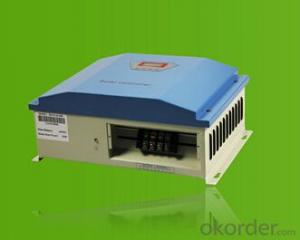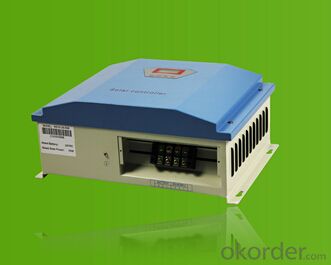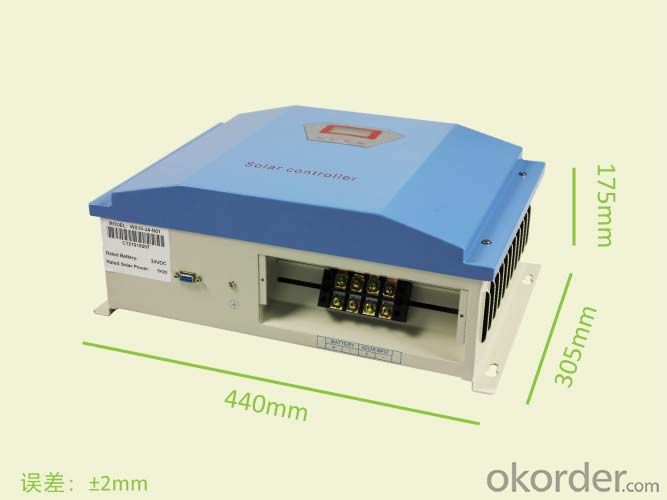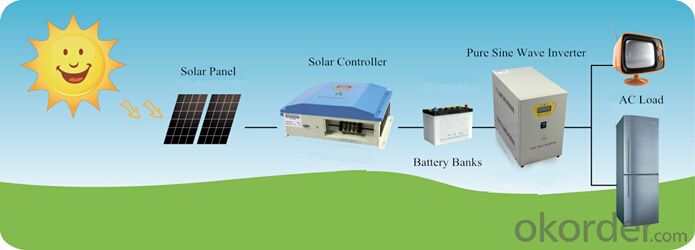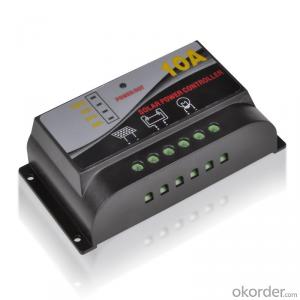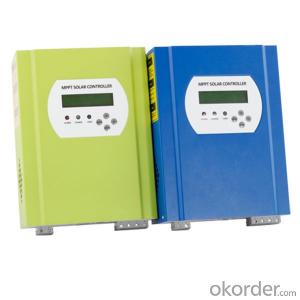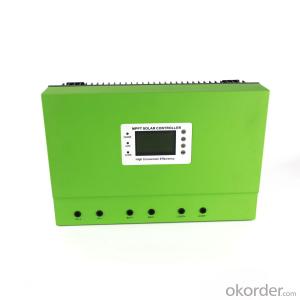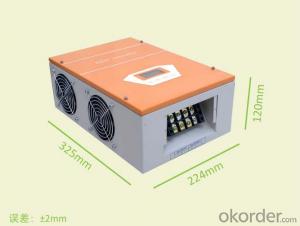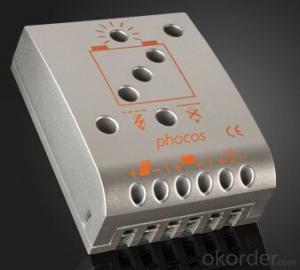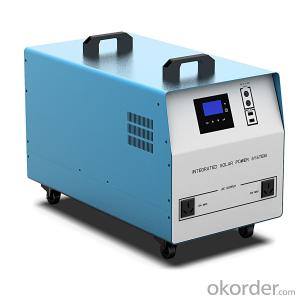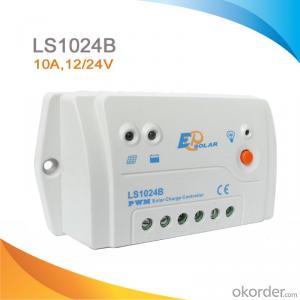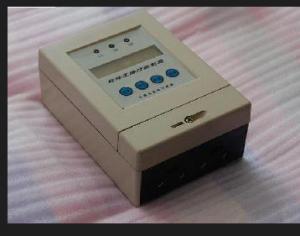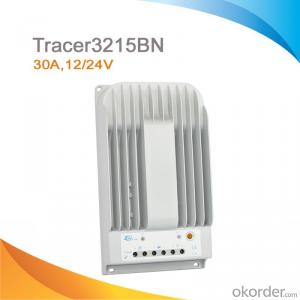American Made Solar Charge Controllers:5kW MPPT Charging Function
- Loading Port:
- Shanghai
- Payment Terms:
- TT or LC
- Min Order Qty:
- 1 unit
- Supply Capability:
- 10000 unit/month
OKorder Service Pledge
OKorder Financial Service
You Might Also Like
I. PRODUCT INTRODUCTION
Solar controller is control device which can control solar panel and transform solar energy into electricity then store to the battery bank. Solar controller is the most important part in off-grid system, whose performance has much effect on life expectancy and operation of the whole system, especially the battery expectancy. Or battery service life will be shortened by over charge or over discharge.
II. PERFORMANCE FEATURES
Superior military-grade components to ensure the product stability.
Perfect protection function, thus the system has higher reliability.
Check and set all operation parameters as requirement from LCD display.
PWM stepless unload mode, which burn the excess power into Dump load, making the battery charging in best status.
III. APPLICATION AREAS
Standalone Photovoltaic power station
Standalone Domestic household photovoltaic power system
Mobil communication base stations, expressway and other non-residential regions.
Coastal islands, remote mountainous, border posts for regions shortage of or without electricity.
Government demonstration projects, landscape lighting project etc.
IV. 5KW TECHNICAL PARAMETERS
Product Model | WS50-48-N00 | WS50-96-N00 | WS50-120-N00 | WS50-220-N00 | WS50-240-N00 |
Rated battery power | 48V | 96V | 120V | 220V | 240V |
Rated solar input power | 5kW | 5kW | 5kW | 5kW | 5kW |
Floating charge voltage | 58V | 116V | 145V | 266V | 290V |
Max Open Circuit Voltage | 100V | 200V | 250V | 458V | 500V |
Dimensions (L x W x H) | 442×307×172 mm | ||||
Net Weight | 8kg | ||||
Display mode | LCD | ||||
Cooling | Fan | ||||
Protection Level | IP20(Indoor) | ||||
Quiescent current | ≤20 mA | ||||
Protection functions | Battery over charge; battery anti-reverse-connection; solar reverse charge protection; solar anti-reverse-connection; lightning protection. | ||||
Ambient temperature | -20~+55℃ | ||||
Ambient humidity | 0~93%,without condensing | ||||
Working altitude | ≤4000m | ||||
In order to serve our customers better, our company can adjust parameter configuration according to customer’s requirement. | |||||
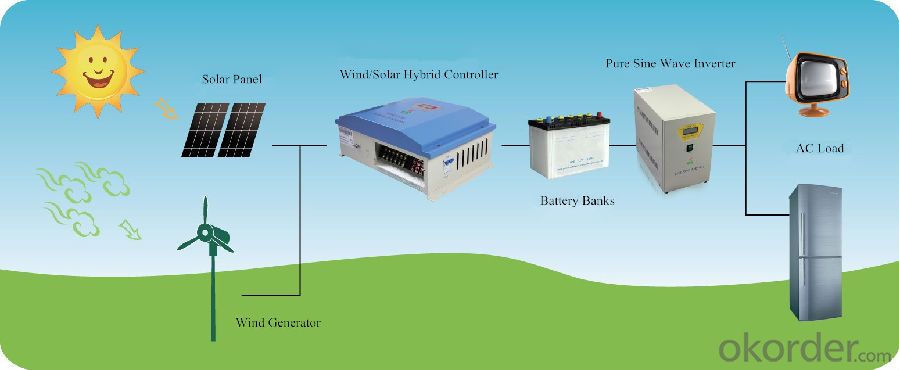
- Q: What is the maximum number of user profiles supported by a solar controller?
- The maximum number of user profiles supported by a solar controller can vary depending on the specific model and brand. However, in general, solar controllers typically support multiple user profiles, ranging from as few as 2 to as many as 10 or more.
- Q: Can a solar controller be used with a solar-powered wind turbine?
- Yes, a solar controller can be used with a solar-powered wind turbine. A solar controller is designed to regulate and optimize the charging of batteries from solar panels. In the case of a solar-powered wind turbine, the solar controller can be used to manage the charging of batteries when the wind is not generating enough power. This helps to ensure efficient energy storage and utilization, maximizing the overall efficiency of the system.
- Q: How does a solar controller handle battery equalization charging?
- A solar controller handles battery equalization charging by monitoring the voltage levels of each individual battery in a battery bank. When the controller detects that the voltage of one or more batteries is significantly lower than the others, it activates the equalization charging mode. During this mode, the solar controller applies a higher voltage to the battery bank, typically around 15 volts, to bring the lower voltage batteries up to the same level as the rest. This process helps to ensure that all batteries in the bank receive an equal charge, maximizing their performance and longevity.
- Q: Can a solar controller be used in a solar-powered electric vehicle charging system?
- Yes, a solar controller can be used in a solar-powered electric vehicle charging system. The solar controller regulates the flow of electricity from the solar panels to the vehicle's battery, ensuring efficient charging and protecting the battery from overcharging.
- Q: Can a solar controller be used with solar panel cooling systems?
- Yes, a solar controller can be used with solar panel cooling systems. A solar controller is responsible for regulating the flow of power from the solar panels to the batteries or grid, and it also monitors and protects the batteries from overcharging or discharging. In the case of solar panel cooling systems, the solar controller can be used to power and control the cooling mechanism. This ensures that the solar panels are kept at optimal temperatures, which can improve their efficiency and prolong their lifespan. By using a solar controller, the cooling system can be operated effectively and efficiently, maximizing the output of the solar panels.
- Q: Can a solar controller be used with solar-powered mobile charging stations?
- Yes, a solar controller can be used with solar-powered mobile charging stations. A solar controller is responsible for regulating the voltage and current from the solar panels to ensure optimal charging of batteries or devices. It helps prevent overcharging and damage to the batteries. Therefore, using a solar controller with solar-powered mobile charging stations is recommended to enhance the efficiency and performance of the charging system.
- Q: Can a solar controller be used with solar panels that are mounted on a boat?
- Certainly, solar panels mounted on a boat can indeed be utilized alongside a solar controller. In fact, it is strongly advised to employ a solar controller in such circumstances to effectively manage the charging procedure and safeguard the battery bank on the boat. By monitoring the voltage and current originating from the solar panels, a solar controller assists in averting overcharging, which could potentially harm the batteries. Additionally, it optimizes the charging process by ensuring that the batteries receive an appropriate charge based on their current state. Consequently, incorporating a solar controller with solar panels on a boat is not solely feasible but also highly advantageous for enhancing the overall performance and lifespan of the battery system.
- Q: What is the maximum discharge current a solar controller can handle?
- The maximum discharge current a solar controller can handle depends on the specific model and its capabilities. It typically ranges from 10 to 60 amps for most residential and small-scale solar systems. However, larger commercial or industrial solar systems may have controllers that can handle higher discharge currents. It is important to refer to the specifications provided by the manufacturer to determine the maximum discharge current for a particular solar controller.
- Q: Can a solar controller be used with deep-cycle batteries?
- Yes, a solar controller can be used with deep-cycle batteries. In fact, a solar controller is specifically designed to regulate the charging process of batteries, including deep-cycle batteries, by preventing overcharging and optimizing the charging efficiency.
- Q: What is the typical standby power consumption of a solar controller?
- The standby power consumption of a solar controller can vary depending on the specific model and brand, but most modern controllers have a very low standby power consumption. On average, these controllers consume as little as 0.1 watts to about 1 watt when not actively controlling the solar system. Efficient design and advanced power-saving technologies enable these controllers to achieve such low standby power consumption. They are designed to minimize energy waste and only use a minimal amount of power when not actively controlling the solar system. It is important to consider that standby power consumption may also be influenced by factors like the size of the solar system, the complexity of the controller's features, and any additional accessories connected to the controller. Thus, it is always advisable to consult the manufacturer's product specifications for accurate information on the standby power consumption of a specific solar controller.
Send your message to us
American Made Solar Charge Controllers:5kW MPPT Charging Function
- Loading Port:
- Shanghai
- Payment Terms:
- TT or LC
- Min Order Qty:
- 1 unit
- Supply Capability:
- 10000 unit/month
OKorder Service Pledge
OKorder Financial Service
Similar products
Hot products
Hot Searches
Related keywords
